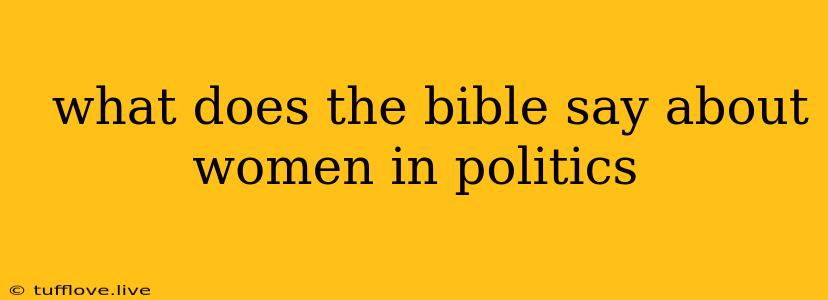The question of women in politics, particularly in the context of religious beliefs, is a complex one with a rich history of interpretation and debate. The Bible, as a sacred text for many, has been used to both support and oppose women's participation in political life. While the Bible does not explicitly endorse or condemn women holding political positions, it offers a variety of verses and stories that can be interpreted in different ways. Examining these verses and their historical context allows for a nuanced understanding of the biblical perspective on women and power.
Scriptural Perspectives on Women and Leadership
The Old Testament offers several instances of women wielding significant influence and power. For example, Deborah is celebrated as a judge and prophetess who led the Israelites to victory against the Canaanites (Judges 4-5). Esther, a queen, courageously intervened to save her people from annihilation (Esther 1-10). These stories suggest that women could be leaders and possess authority in ancient Israel. However, it's important to acknowledge that these women's roles were often linked to specific circumstances and their actions were sometimes driven by necessity.
The New Testament also presents both supportive and restrictive views regarding women's roles. Mary Magdalene, a follower of Jesus, played a crucial role in his ministry and was the first to witness his resurrection (Luke 8:2, John 20:16). Phoebe, described as a "deacon" (Romans 16:1), held a position of responsibility in the early church. However, 1 Timothy 2:12 states, "I do not permit a woman to teach or to have authority over a man, but to be in silence." This passage has often been used to justify excluding women from leadership positions in churches and society.
Interpreting Biblical Passages
It's essential to approach biblical interpretation with sensitivity and recognize the cultural context in which these texts were written. The Old Testament reflects a patriarchal society where women's roles were largely confined to the domestic sphere. However, the emphasis on justice, mercy, and compassion throughout the Bible can be applied to issues of women's rights and participation in politics.
The New Testament also presents a complex picture. Some scholars argue that 1 Timothy 2:12 should be understood in the context of the specific cultural and social norms of the time. They suggest that the passage is addressing a particular issue within the early church, not a universal prohibition on women's leadership.
Contemporary Perspectives
In modern times, the question of what does the bible say about women in politics continues to be debated within Christian communities. Some churches advocate for the equal participation of women in all areas of church life, including leadership, while others maintain more traditional views based on their interpretation of specific biblical passages.
Feminist theology, a movement that aims to reinterpret biblical texts from a woman's perspective, has challenged patriarchal interpretations and highlighted the importance of women's voices in the church and society. This movement advocates for women's full equality in all areas, including political participation.
Conclusion
The Bible, with its rich history and complex teachings, offers a multifaceted perspective on women and their roles in society. While some interpretations may emphasize the limitations of women's authority, others highlight the examples of powerful women in Scripture and advocate for a more egalitarian reading. Ultimately, the question of what does the bible say about women in politics is a matter of ongoing interpretation and debate.
